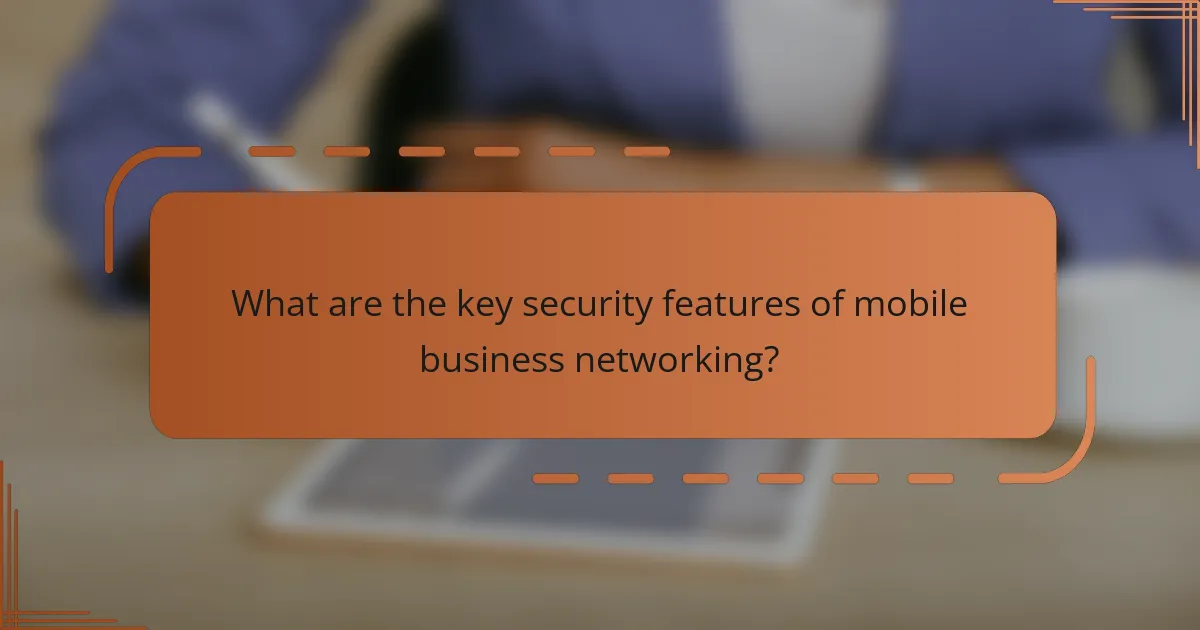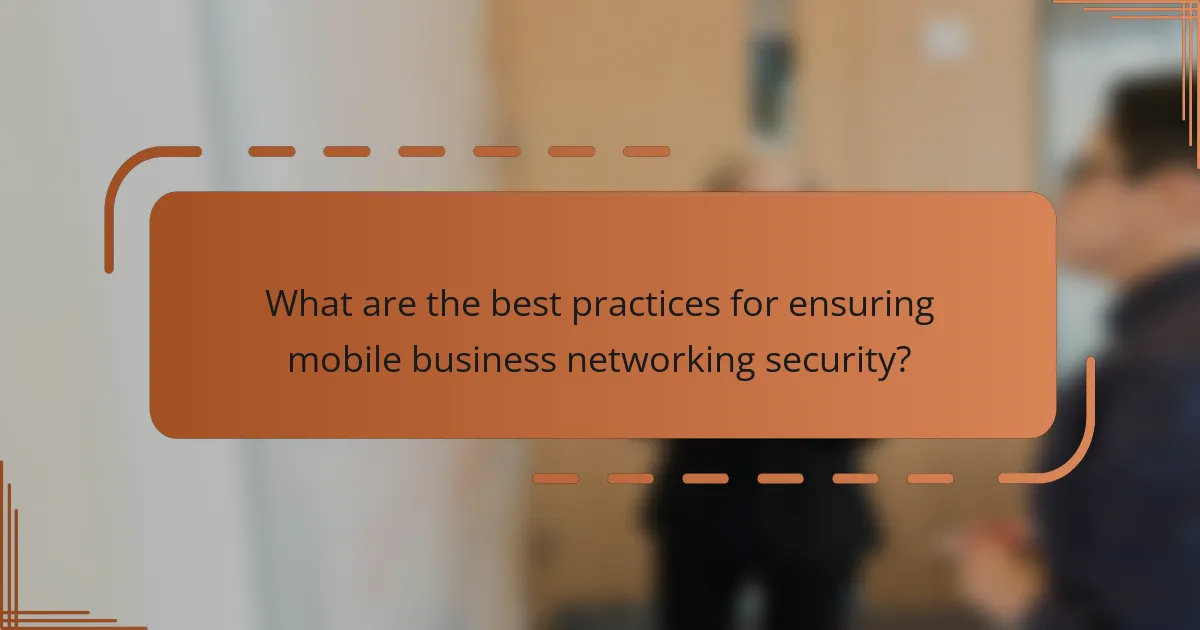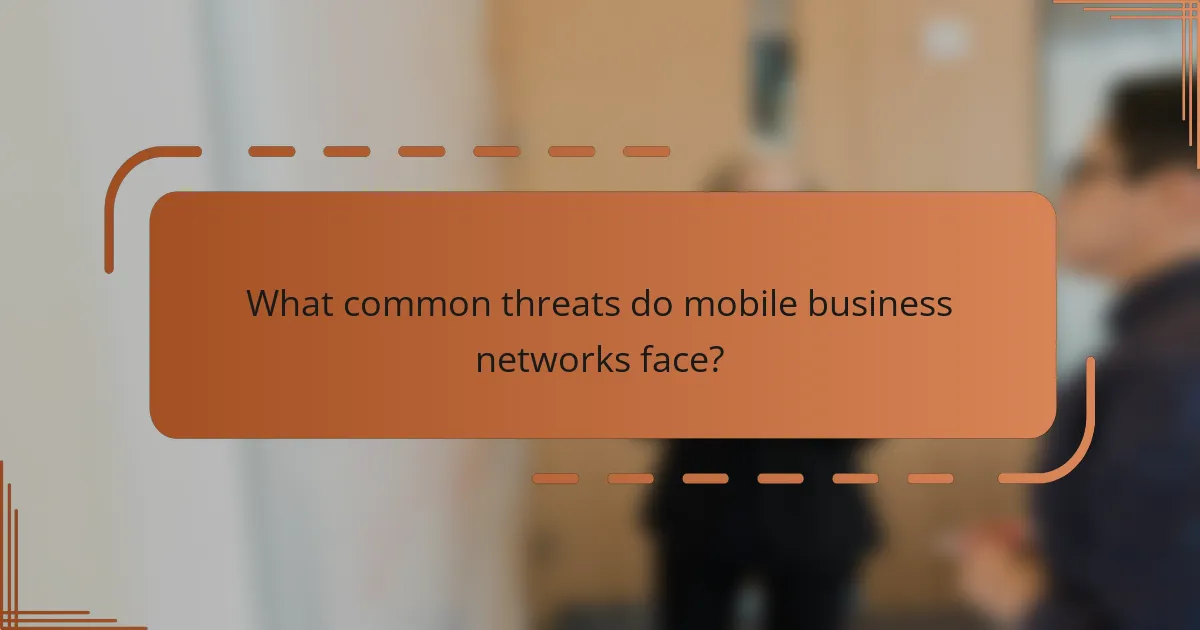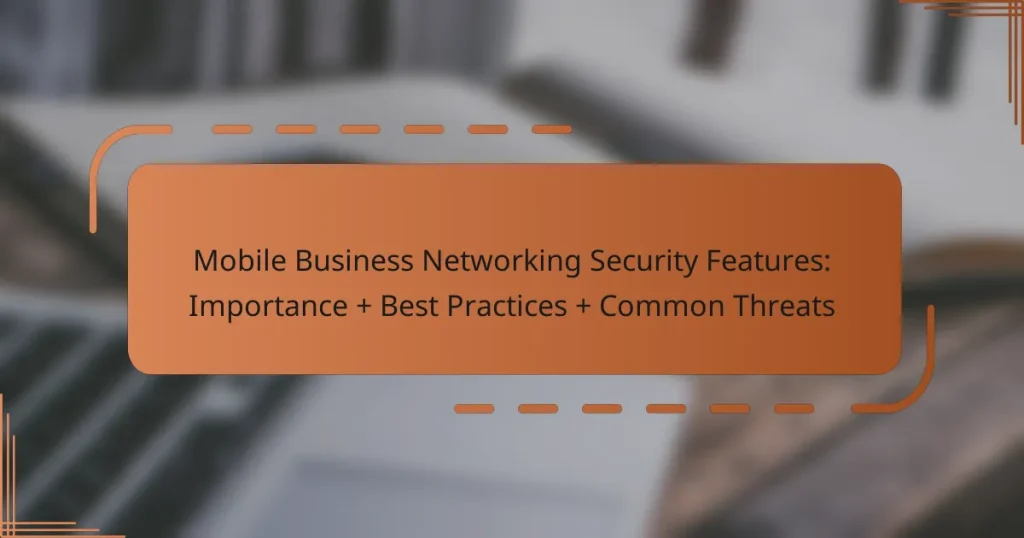Mobile business networking security encompasses critical features designed to protect sensitive information in a digital landscape. Key security features include encryption for data confidentiality, secure authentication methods like biometrics and two-factor authentication, and data loss prevention strategies. Best practices for enhancing security involve using strong passwords, enabling two-factor authentication, regularly updating software, utilizing virtual private networks (VPNs), educating employees on phishing threats, and backing up data. Common threats to mobile business networks include data breaches, malware attacks, phishing attempts, man-in-the-middle attacks, and vulnerabilities from insecure Wi-Fi networks. Addressing these security concerns is essential for maintaining the integrity and confidentiality of business communications.

What are the key security features of mobile business networking?
Key security features of mobile business networking include encryption, secure authentication, and data loss prevention. Encryption protects data transmitted over networks, ensuring confidentiality. Secure authentication verifies user identity through methods like biometrics or two-factor authentication. Data loss prevention safeguards sensitive information from unauthorized access or leaks. Additionally, mobile device management (MDM) solutions enable organizations to control and secure devices. Regular security updates and patches are crucial to protect against vulnerabilities. These features collectively enhance the security posture of mobile business networking.
How do these security features protect mobile business networks?
Security features protect mobile business networks by implementing various protective measures. These measures include encryption, which secures data during transmission. Authentication protocols verify user identities before granting access. Firewalls monitor and control incoming and outgoing network traffic based on predetermined security rules. Intrusion detection systems identify and respond to potential threats in real-time. Virtual private networks (VPNs) create secure connections over public networks. Regular updates and patches protect against vulnerabilities. Together, these features create a layered defense, minimizing the risk of unauthorized access and data breaches.
What types of encryption are commonly used in mobile networking?
Common types of encryption used in mobile networking include AES, RSA, and TLS. AES (Advanced Encryption Standard) is widely used for securing data due to its efficiency and strong security. RSA (Rivest-Shamir-Adleman) is commonly used for secure key exchange. TLS (Transport Layer Security) is essential for encrypting data transmitted over networks. These encryption methods help protect sensitive information from unauthorized access. AES, for example, uses a block cipher approach, making it robust against various attacks. RSA relies on the mathematical difficulty of factoring large numbers, ensuring secure communication. TLS combines both symmetric and asymmetric encryption, providing a secure channel over an insecure network.
How does authentication enhance security in mobile business networking?
Authentication enhances security in mobile business networking by verifying the identities of users and devices. It ensures that only authorized individuals can access sensitive information and resources. This process typically involves methods such as passwords, biometrics, or multi-factor authentication. By implementing these measures, organizations reduce the risk of unauthorized access and data breaches. According to a study by Verizon, 81% of data breaches involve stolen or weak passwords. Therefore, strong authentication protocols are crucial for protecting mobile business networks from cyber threats.
What role does access control play in securing mobile networks?
Access control is crucial in securing mobile networks by regulating who can access network resources. It ensures that only authorized users can connect to the network and utilize its services. This minimizes the risk of unauthorized access, which can lead to data breaches and other security incidents. Effective access control mechanisms include authentication methods, such as passwords and biometric verification. According to a 2021 study by the International Journal of Information Security, organizations implementing strict access control measures saw a 30% reduction in security breaches. This demonstrates the effectiveness of access control in enhancing mobile network security.
Why is it important to prioritize security in mobile business networking?
Prioritizing security in mobile business networking is crucial to protect sensitive data. Mobile devices are often vulnerable to various cyber threats. These threats include malware, phishing attacks, and unauthorized access. According to a 2021 report by IBM, 43% of data breaches involve small businesses, highlighting the risk. Additionally, mobile devices frequently connect to unsecured networks, increasing exposure to attacks. Implementing robust security measures can mitigate these risks. Effective security practices safeguard company assets and maintain customer trust. Ultimately, prioritizing security is essential for business continuity and reputation.
What are the potential risks of neglecting mobile networking security?
Neglecting mobile networking security can lead to significant risks, including data breaches and unauthorized access. Cybercriminals can exploit vulnerabilities in unsecured mobile networks. This often results in the theft of sensitive information, such as personal data or financial details. According to a 2021 report by Cybersecurity Ventures, cybercrime is projected to cost the world $10.5 trillion annually by 2025. Additionally, malware can infiltrate devices through insecure connections, leading to further compromise. Organizations may also face legal and financial repercussions from data breaches. Furthermore, neglecting security can damage a company’s reputation, resulting in lost customer trust. Overall, the risks of ignoring mobile networking security are substantial and multifaceted.
How can strong security measures contribute to business success?
Strong security measures enhance business success by protecting sensitive data and maintaining customer trust. Effective security reduces the risk of data breaches, which can lead to significant financial losses. According to IBM’s 2021 Cost of a Data Breach Report, the average cost of a data breach is $4.24 million. Businesses with robust security protocols experience fewer incidents and lower recovery costs. Additionally, strong security measures foster a positive brand reputation. Customers are more likely to engage with businesses that prioritize their data protection. This engagement can lead to increased sales and customer loyalty. Overall, investing in security is essential for sustainable business growth.

What are the best practices for ensuring mobile business networking security?
Implementing strong mobile business networking security involves several best practices. First, use strong, unique passwords for all accounts. This reduces the risk of unauthorized access. Second, enable two-factor authentication wherever possible. This adds an extra layer of security. Third, regularly update all software and applications. Keeping them current protects against vulnerabilities. Fourth, utilize a virtual private network (VPN) for secure internet access. VPNs encrypt data, safeguarding it from potential threats. Fifth, educate employees about phishing attacks and suspicious links. Awareness can prevent many security breaches. Lastly, regularly back up data to mitigate loss in case of an attack. These practices collectively enhance mobile business networking security and protect sensitive information.
How can businesses implement effective security policies for mobile networking?
Businesses can implement effective security policies for mobile networking by establishing clear guidelines and protocols. These policies should address data encryption, access controls, and device management. Regular security training for employees is essential to ensure compliance and awareness. Organizations must also conduct regular security assessments to identify vulnerabilities. Monitoring mobile network traffic can help detect unauthorized access attempts. Utilizing mobile device management (MDM) solutions enhances control over devices. Additionally, businesses should enforce strong password policies and two-factor authentication. According to a 2021 report by Cybersecurity & Infrastructure Security Agency, organizations that implement robust security policies significantly reduce the risk of data breaches.
What training should employees receive regarding mobile security?
Employees should receive training on mobile security best practices. This includes recognizing phishing attempts and suspicious links. Training should cover the importance of using strong, unique passwords. Employees need to understand how to enable multi-factor authentication. Awareness of secure Wi-Fi usage is crucial to prevent data breaches. Employees should learn how to identify and report security incidents. Regular updates and patch management for mobile devices should be emphasized. Understanding the risks of downloading unauthorized apps is also essential.
How often should security protocols be updated and reviewed?
Security protocols should be updated and reviewed at least annually. Regular updates are essential due to evolving threats and vulnerabilities. Additionally, reviews should occur after any significant security incident. This ensures that protocols remain effective and relevant. Industry standards often recommend quarterly assessments for high-risk environments. Many organizations adopt a continuous monitoring approach to stay ahead of potential breaches. Compliance regulations also necessitate regular updates to security measures. Overall, frequent reviews and updates enhance the overall security posture.
What tools and technologies can enhance mobile networking security?
VPNs (Virtual Private Networks) enhance mobile networking security by encrypting data transmitted over the internet. They create a secure tunnel between the user’s device and the internet. This prevents unauthorized access to sensitive information. Firewalls are also critical as they monitor and control incoming and outgoing network traffic. They block malicious traffic and protect devices from attacks.
Mobile Device Management (MDM) solutions help organizations secure, monitor, and manage mobile devices. They enforce security policies and ensure compliance with regulations. Anti-malware software protects devices from viruses and other malicious software. It regularly scans and removes threats.
Two-factor authentication (2FA) adds an extra layer of security. It requires users to provide two forms of identification before accessing accounts. This significantly reduces the risk of unauthorized access. Encryption technologies protect data at rest and in transit. They make it unreadable to unauthorized users.
Regular software updates are essential for security. They fix vulnerabilities and improve device security. These tools and technologies collectively enhance mobile networking security by safeguarding sensitive information against various threats.
Which mobile security applications are recommended for businesses?
Mobile security applications recommended for businesses include Microsoft Intune, Lookout, and MobileIron. Microsoft Intune provides mobile device management and application management capabilities. Lookout specializes in threat detection and data loss prevention. MobileIron offers secure access to corporate applications and data. These applications are essential for protecting sensitive business information. They help mitigate risks associated with mobile devices accessing corporate networks. Security features include encryption, remote wipe, and real-time threat monitoring. Businesses benefit from enhanced compliance and reduced vulnerabilities by using these applications.
How can businesses leverage VPNs for secure mobile networking?
Businesses can leverage VPNs to enhance secure mobile networking by encrypting data transmitted over public networks. This encryption protects sensitive information from unauthorized access. VPNs create a secure tunnel between the user’s device and the company’s network. This ensures that data remains confidential, even on unsecured Wi-Fi connections.
According to a report by Cybersecurity Ventures, 60% of small businesses experience a cyber attack each year. VPNs significantly reduce the risk of data breaches by masking the user’s IP address. They also allow remote employees to access company resources securely. Furthermore, VPNs can help businesses comply with data protection regulations. This compliance is crucial for maintaining customer trust and avoiding fines.

What common threats do mobile business networks face?
Mobile business networks face several common threats. These include data breaches, which occur when unauthorized individuals access sensitive information. Malware attacks are another significant threat, where malicious software compromises network security. Phishing attacks target users to steal credentials or sensitive data through deceptive emails or websites. Man-in-the-middle attacks intercept communications between two parties, allowing attackers to eavesdrop or alter information. Additionally, insecure Wi-Fi networks expose mobile devices to unauthorized access. According to a report by Verizon, 30% of data breaches involve mobile devices, highlighting the urgency of addressing these threats.
What types of cyberattacks target mobile business networking?
Mobile business networking is targeted by various types of cyberattacks. Common attacks include phishing, where attackers deceive users into providing sensitive information. Malware attacks involve malicious software infiltrating devices to steal data or disrupt operations. Man-in-the-middle attacks intercept communications between devices, compromising data integrity. Denial-of-service attacks overwhelm networks, causing disruptions in service. Additionally, ransomware can lock users out of their systems until a ransom is paid. According to a 2021 report by Cybersecurity Ventures, mobile malware attacks increased by 50% year-over-year, highlighting the growing threat landscape.
How do phishing attacks affect mobile business users?
Phishing attacks significantly compromise mobile business users by targeting their sensitive information. These attacks often involve deceptive messages that appear legitimate. Users may inadvertently provide personal data, login credentials, or financial information. The result can lead to unauthorized access to corporate accounts. According to the 2021 Verizon Data Breach Investigations Report, 36% of data breaches involved phishing. Mobile devices are particularly vulnerable due to their constant connectivity and use of apps. This vulnerability can result in financial loss and reputational damage for businesses. Additionally, phishing can disrupt operations and lead to increased security costs.
What are the implications of malware on mobile devices in business settings?
Malware on mobile devices in business settings can lead to significant data breaches and financial losses. It can compromise sensitive company information, including client data and proprietary business strategies. According to a report by Cybersecurity Ventures, global cybercrime damages are expected to reach $10.5 trillion annually by 2025. Mobile malware can also disrupt business operations by rendering devices inoperable or causing network outages. Additionally, it can facilitate unauthorized access to corporate networks, increasing the risk of further attacks. Employees may unknowingly install malware through malicious apps or phishing attempts, further endangering organizational security. The implications also extend to reputational damage, as clients may lose trust in a business that fails to protect their information. Overall, the presence of malware poses a critical threat to the integrity and functionality of business operations.
What are the signs of a security breach in mobile networking?
Unusual data usage is a primary sign of a security breach in mobile networking. This can manifest as unexpectedly high data consumption on mobile plans. Frequent disconnections from the network may also indicate unauthorized access. Additionally, users might notice unfamiliar applications installed without their consent. Slow device performance can be a symptom of malicious activity. Unrecognized logins or activity in user accounts should raise alarms. Receiving strange messages or notifications may signify a breach as well. Lastly, changes in device settings without user action are a critical warning sign.
How can businesses detect unauthorized access to their mobile networks?
Businesses can detect unauthorized access to their mobile networks through various monitoring techniques. Implementing intrusion detection systems (IDS) helps identify unusual patterns of network traffic. Regularly reviewing access logs can reveal unauthorized login attempts. Utilizing network analytics tools can help in identifying anomalies in data usage. Employing multi-factor authentication adds an additional layer of security. Real-time alerts can notify administrators of suspicious activities immediately. Furthermore, conducting periodic security audits can uncover vulnerabilities. These methods collectively enhance the ability to detect unauthorized access effectively.
What steps should be taken immediately after identifying a breach?
Immediately isolate affected systems to prevent further damage. This step limits the breach’s impact and secures sensitive data. Next, assess the breach’s scope to understand what information was compromised. Document all findings meticulously for future analysis and reporting. Notify relevant stakeholders, including IT teams and management, to ensure a coordinated response. If necessary, inform law enforcement and regulatory bodies, as legal obligations may apply. Finally, initiate a recovery plan to restore normal operations and enhance security measures to prevent future breaches. These steps align with best practices in incident response and are essential for effective breach management.
What practical tips can businesses follow to enhance mobile networking security?
Businesses can enhance mobile networking security by implementing several practical measures. First, they should ensure all devices are encrypted. Encryption protects sensitive data from unauthorized access. Second, businesses must utilize strong, unique passwords for all devices and applications. This reduces the risk of unauthorized entry. Third, they should enable multi-factor authentication wherever possible. Multi-factor authentication adds an extra layer of security.
Fourth, regular software updates are crucial. Updates often include security patches that protect against new threats. Fifth, businesses should educate employees about phishing attacks. Employee awareness can significantly reduce the risk of falling victim to such scams.
Lastly, using a virtual private network (VPN) is advisable. A VPN secures internet connections and protects data from interception. According to a report by Cybersecurity Ventures, mobile devices are targeted in 60% of cyberattacks, highlighting the need for robust security measures.
Mobile business networking security features encompass critical elements such as encryption, secure authentication, and data loss prevention, which collectively enhance the security posture of mobile networks. The article explores how these features protect against common threats like data breaches, malware, and phishing attacks while emphasizing the importance of prioritizing security to safeguard sensitive information. Additionally, it outlines best practices for implementing effective security measures, including the use of strong passwords, multi-factor authentication, and regular software updates. The discussion also highlights the role of tools such as VPNs and mobile device management solutions in fortifying mobile networking security.


